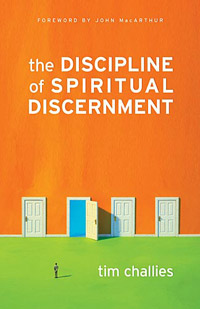Tim Challies: The Discipline of Spiritual Discernment
 Tim Challies, The Discipline of Spiritual Discernment (Wheaton: Crossway, 2007), 206 pages, ISBN 9781581349092.
Tim Challies, The Discipline of Spiritual Discernment (Wheaton: Crossway, 2007), 206 pages, ISBN 9781581349092.
Challies, editor of Discerning Reader, a book review website and host of the Christian blog Challies.com: Informing the Reforming, premises his book on the stated intent to present a thoroughly bibliocentric approach in teaching principles of spiritual discernment that equip believers to carefully distinguish truth from error; right from wrong. He instructs the reader by explaining both the benefits of discernment and the cost of ignoring or minimizing this gift. The author carefully explores the definition of discernment and two primary areas of life requiring discernment: “knowing the truth and discerning the will of God for our lives” (17). He further examines discernment in its context as a gift of the Holy Spirit and the “potential dangers inherent in a distorted understanding of discernment,” concluding his study with an examination of “the commitments, context, character and confirmation of discernment” (17).
The author maintains a high view of Scripture in supporting, as foundational to all Christian theology and practice, the five solas of the Reformation, specifically sola scriptura (Scripture alone). Challies adheres to the Cambridge Declaration, as written by the Alliance of Confessing Evangelicals, indicating that “The Bible alone teaches all that is necessary for our salvation from sin and is the standard by which all Christian behavior must be measured” (46). He views discernment as undergoing a battle of sorts, maintaining that over thirty years ago, “the doctrine of the Bible’s inerrancy . . . came under attack from both within the church and without” (46).
Challies believes that the battle has been primarily won through the efforts of, among others, J. I. Packer, R. C. Sproul and Francis Schaeffer. He agrees with James Montgomery Boice’s assertion that “The most serious issue, I believe, is the Bible’s sufficiency” (46). In quoting Boice, the author emphasizes his concern that many Christians fail to approach the Bible as a preeminent document, instead charging “with reckless abandon” that too high a view of Scripture has resulted in bibliolatry (Bible worship), and denying that Scripture is sufficient to address evangelism, sanctification, counsel, reform, discernment and other matters (47).
In Challies’ discussion of discernment as a spiritual charism, the author points to the dichotomy of opinion among cessationist and continuationist camps concerning miraculous gifts. His position is that there is much about which both camps can agree, especially that “God can and does dispense [today] a gift of spiritual discernment” (125). He emphasizes that all varieties of giftings are “not meant not to disrupt the church but to unify it through diversity” and to “build a stronger church” (125). The author underlines that it is through the expression of the Spirit’s gifts
that God’s “power and presence can be manifested in the church” and for the purpose of the common good. Challies highlights the importance of not allowing a particular gift, such as discernment, to become “the most prominent aspect of one’s identity as a Christian . . .” (127.) He also addresses the question: Is the gift of discernment in today’s church the same “gift of distinguishing between spirits as it existed in New Testament times?” (128). He is not convinced the question needs a resolution, indicating that for both the nascent New Testament Church and the contemporary Church, “the gift of discernment is the Spirit’s special defense against the lies that come from lying spirits” (129). Therefore discernment, he maintains, is not only a gift, but a responsibility in protecting the integrity of interpretation, doctrine, preaching, and teaching.
Category: Fall 2011, Living the Faith, Pneuma Review


